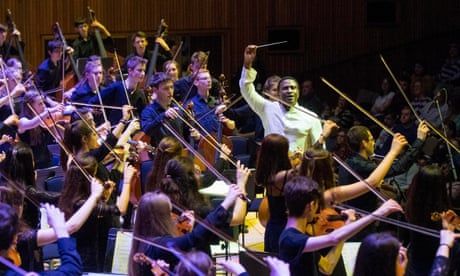
Movies, pop and video games all borrow from orchestral music – borrowing in return helps me engage as many young people as I can
In 2019, at a concert by Boston’s Handel and Haydn Society, the final chord of Mozart’s Masonic Funeral Music swelled then ebbed into a reverent silence. On any other evening, the cognoscenti at such an event would freeze for several seconds before launching into applause. But on this occasion, that sacred silence was pierced by a high-pitched “Wow!” from the stalls where Ronan, a nine-year-old with special needs attending with his grandfather, could contain his enthusiasm no longer, delivering his rave review on the spot. The moment was captured by local radio, eventually making its way on to social media where I discovered it with tens of thousands of others. As I listened, I remarked to myself that, as a professional conductor, I’d be thrilled to inspire that kind of spontaneous fascination in a young audience member, especially since childhood exposure to the orchestra is what inspired my love of classical music and a fulfilling career in its service.
I was raised in the Trinidad and Tobago of the late 70s and early 80s where, not being particularly interested in calypso or carnival, I found myself entranced by orchestral movie soundtracks, annual productions from the country’s Opera Society, and television broadcasts of concerts Live from Studio 8H, an NBC venue that hosted the New York Philharmonic (NYP). When I was just Ronan’s age, I had videotaped one such performance featuring soprano Leontyne Price, violinist Itzhak Perlman and conductor Zubin Mehta, watching it ad nauseam until, one tragic day, the machine ate the tape. I realise now that every time I watched that concert, I too thought “Wow!” and imagined what it would be like to hear the NYP play in real life or even do what Mehta was doing.
Kwamé Ryan is a symphonic and operatic conductor based in Germany. He is music director of the Charlotte Symphony Orchestra and guest conducts worldwide
Continue reading...